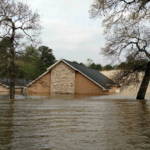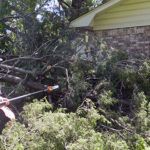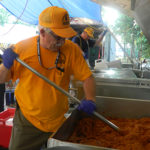WEST—Fourteen months ago, John Crowder didn’t know the difference between disaster relief and disaster recovery. He just knew his community needed help.
In the months since a fertilizer plant explosion rocked his town, the pastor of First Baptist Church in West has gained expertise in disaster response and appreciation for the roles Texas Baptist Men and the Baptist General Convention of Texas performed immediately and long-term.
 A fertilizer plant explosion rocked the town of West, Texas, on April 17, 2013. (Photo courtesy of Texas Department of Public Safety)“I have learned there is short-term disaster relief and long-term disaster recovery. And we need volunteers and donations for both,” he said.
A fertilizer plant explosion rocked the town of West, Texas, on April 17, 2013. (Photo courtesy of Texas Department of Public Safety)“I have learned there is short-term disaster relief and long-term disaster recovery. And we need volunteers and donations for both,” he said.
Crowder and his wife, Lisa, were returning from a regional track meet in Bryan involving their daughter, Ashley, when his cell phone began ringing around 8 p.m. on April 17, 2013. They soon learned about an ammonium nitrate explosion at the West Fertilizer Company, a half-mile from their home and a mile from the church building.
“We had Royal Ambassadors playing kickball outside the church who were knocked to the ground. That tells you something about the force of the explosion,” he said.
Phil Immicke, associate pastor at First Baptist Church, immediately went to work helping connect parents and children. He also made the church’s van available to authorities to transport nursing home residents who had to be evacuated from a facility near the blast site.
 John Crowder, pastor of First Baptist Church in West, said most West residents generally have reached the “acceptance” stage of the grief process after the disaster.When Crowder arrived in West, he took his wife and daughter to a deacon’s home outside the area cordoned-off by emergency workers. Then he went to the community center, where medical personnel had set up a triage for wounded residents.
John Crowder, pastor of First Baptist Church in West, said most West residents generally have reached the “acceptance” stage of the grief process after the disaster.When Crowder arrived in West, he took his wife and daughter to a deacon’s home outside the area cordoned-off by emergency workers. Then he went to the community center, where medical personnel had set up a triage for wounded residents.
“They wouldn’t let me in the building. It was a terribly helpless feeling. I’ve invested two decades in the lives of these folks, and I wanted to be able to do something,” Crowder said. “Now, I totally understand and agree with that decision. I had no business there.”
After doing his best to comfort some of his distraught neighbors outside the community center, Crowder called Tim Randolph, director of missions for Waco Regional Baptist Association, and Chris Liebrum, who heads the Baptist General Convention of Texas disaster recovery ministry. They, in turn, helped connect him to Terry Henderson, state disaster relief director for Texas Baptist Men.
Sign up for our weekly edition and get all our headlines in your inbox on Thursdays
 As Crowder discovered, trained TBM volunteers provide rapid response and emergency support in the hours and days immediately after a disaster.
As Crowder discovered, trained TBM volunteers provide rapid response and emergency support in the hours and days immediately after a disaster.
“Texas Baptist Men were here the next morning” after the explosion, Crowder said. “They had boots on the ground, providing relief with their volunteers. They started clearing debris and made boxes available to people to pack their belongings.
“As far as the people in our community were concerned, one-third of us could not get to our houses. That meant we had no food, no showers, no clothes or a place to wash clothes. TBM set up shower and laundry units in our church parking lot and fed people from our fellowship hall.”
Early on, the BGCT provided an architect and structural engineer to inspect the facility at First Baptist to make sure it was safe and sound, in spite of some superficial damage. BGCT Executive Director David Hardage and Liebrum visited with Crowder the day after the explosion, began making plans for long-term disaster recovery and helped explain the distinct roles TBM and the BGCT perform after a disaster.
 Volunteers clean up rubble left by the explosion in West.“There is a big difference in relief and recovery. If you are in a serious accident, you go immediately to a doctor to get some immediate relief, help and comfort. Weeks or months later, you start your long-term recovery. Both treatments are necessary—but different,” said Don Gibson, TBM executive director.
Volunteers clean up rubble left by the explosion in West.“There is a big difference in relief and recovery. If you are in a serious accident, you go immediately to a doctor to get some immediate relief, help and comfort. Weeks or months later, you start your long-term recovery. Both treatments are necessary—but different,” said Don Gibson, TBM executive director.
TBM provides immediate relief, he explained—a task the organization has fulfilled 47 years. TBM has more than 11,000 trained volunteers and more than 100 pieces of disaster relief equipment stationed around Texas. In West, some TBM heavy-equipment operators gained their first experience demolishing homes—a service that saved homeowners thousands of dollars.
Texas Baptists’ Disaster Recovery—a program coordinated by the BGCT Executive Board staff—typically begins in earnest about the time TBM volunteers begin wrapping up immediate relief, said Marla Bearden, BGCT disaster recovery specialist.
“We are not interested in reinventing the wheel,” Bearden said. “We look for places where we can add to what TBM already does.”
Texas Baptists’ Disaster Recovery works in the weeks, months and even years after an initial response to assist with long-term development of affected communities. In West, one key role involved coordination of volunteers who wanted to respond.
 Hundreds of West citizens and Central Texans lined University Parks Drive in Waco on April 25, 2013, in remembrance of the 15 people who died and more than 200 who were injured in the devastating explosion on April 17, 2013, in West. (Baylor University Photo)“Three days after the disaster, I started getting calls from people who wanted to come help. I said, ‘I cannot physically or emotionally manage my life, my family, my church and hundreds of volunteers who want to come here,’” Crowder said.
Hundreds of West citizens and Central Texans lined University Parks Drive in Waco on April 25, 2013, in remembrance of the 15 people who died and more than 200 who were injured in the devastating explosion on April 17, 2013, in West. (Baylor University Photo)“Three days after the disaster, I started getting calls from people who wanted to come help. I said, ‘I cannot physically or emotionally manage my life, my family, my church and hundreds of volunteers who want to come here,’” Crowder said.
Texas Baptists’ Disaster Recovery enlisted a volunteer coordinator to work in West for several months, managing the logistics of groups and individuals who wanted to donate their labor.
Like many residents, Crowder could not enter his home for 10 days. He found the front door blown in, window glass embedded in walls and much of the ceiling caved in, with drywall and insulation hanging down.
“We moved four times in six weeks,” he recalled. Eventually, he and his family settled in a doublewide mobile home a deacon set up on his property near Gholson. They have remained there while their home is being rebuilt.
Crowder appreciates the contributions Texas Baptists’ Disaster Recovery made in West and continues to make as the community seeks to rebuild and begin life anew. Last summer, the BGCT sponsored “Loving West,” a weeklong volunteer effort aimed at clearing debris and preparing home sites for rebuilding. About 650 members of churches around the state participated.
During spring break, more than 300 volunteers worked in West with Shalom Builders, a Texas Baptists’ Disaster Recovery program that mobilizes trained and equipped construction workers to serve in areas hit by disaster.
 About 650 members of churches around the state participated in the Loving West relief effort last summer. (BGCT Communications Photo)A key component of disaster recovery involves working with local committees for long-term recovery. Crowder serves on the board of the local long-term relief committee and the nonprofit organization it formed to administer funds, the West Texas Foundation.
About 650 members of churches around the state participated in the Loving West relief effort last summer. (BGCT Communications Photo)A key component of disaster recovery involves working with local committees for long-term recovery. Crowder serves on the board of the local long-term relief committee and the nonprofit organization it formed to administer funds, the West Texas Foundation.
Short-term, the local ministerial alliance established a system enabling churches to meet immediate needs with minimal administrative slow-downs. Long-term, the group worked with the newly created foundation to administer additional funds for needs such as medical bills, which took months to process, and rebuilding.
Along the way, Crowder has learned important lessons.
“Some people like to donate gift cards, and that’s great. When we were out of our house for 10 days with just the clothes on our backs from a track meet, gift cards helped,” he said. But in a small community like West, gift cards to a major discount store helped stimulate the economy in nearby Waco—not in the community hit by disaster, he added.
‘Gift cards are good. Money is better’
“Relief involves helping families immediately get what they need. Recovery involves helping local businesses get back on their feet,” he said. “Gift cards are good. Money is better.”
The committee has helped provide professional counseling for residents who need it, and Crowder and other ministers have offered their share of pastoral counseling, as well.
“There’s been a pretty steady stream of folks who just needed somebody to talk to. In some cases, they just needed somebody to be mad at. That’s not much fun, but anger is part of the grief process,” he said.
“People who are helping are the ones who get the brunt of that anger, and you just have to be OK with that.”
First Baptist has “seen revival” since the disaster, he added, noting he already has baptized more people in 2014 than in the three previous years combined, and attendance has increased significantly in the past year.
“Something like this has a way of making people re-evaluate their priorities,” he said.
As a community, West residents generally have reached the “acceptance” stage of the grief process, he added.
‘Permission to move forward’
“Most people have come to the point where they see it as real,” he said. Crowder added a communitywide service on April 17 marking the one-year anniversary helped with the healing process, giving residents “permission to move forward with their lives.”
Through it all, he expressed appreciation for the support Texas Baptists provided.
“Texas Baptists led us well through both phases—relief and recovery,” he said. “I hope our people will recognize both are appropriate and important. We need to give to both phases and volunteer in ways that really help—not necessarily in ways and times that are always most convenient.”














We seek to connect God’s story and God’s people around the world. To learn more about God’s story, click here.
Send comments and feedback to Eric Black, our editor. For comments to be published, please specify “letter to the editor.” Maximum length for publication is 300 words.